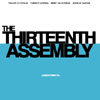The Thirteenth Assembly, "(un)sentimental"
 Representing the first quartet effort of a series of musicians who have long been in association with one another—most often in duet settings—this debut effectively mixes a variety of contemporary musical tactics into a unique and accomplished stylistic melting pot. While too many efforts that take on this broad a range of material lack in depth however, this quartet has the chops to pull it off without losing its spirit of adventure.
Representing the first quartet effort of a series of musicians who have long been in association with one another—most often in duet settings—this debut effectively mixes a variety of contemporary musical tactics into a unique and accomplished stylistic melting pot. While too many efforts that take on this broad a range of material lack in depth however, this quartet has the chops to pull it off without losing its spirit of adventure.
Part of the intrigue of the musical interplay here is surely due to the unusual instrumental lineup. Consisting of Braxton cornetist Taylor Ho Bynum, violaist Jessica Pavone, guitarist Mary Halvorson, and drummer Tomas Fujiwara, the ensemble has an uncommon airiness in all of its endeavors. Never bogged down by weighty riffs, the compositions here float along in the mid and high ranges with a breezy and emotive ease of movement. While each work here represents a different approach (all members contributed compositions) the overall effect is a unified and mobile whole that gives the album a logical but gentle momentum.
The quartet's depth can be seen from the beginning, as the brief "Unfinished Ballad" slips gently into the funkier proceedings on "Army of Strangers." Here, the unit combines tight, James Brown rhythms with modern Bloodcount-like elasticity. Despite brief solos all around, no musician ever stands out or takes over as line after line is woven together in the name of the composition. Which is really the point on display throughout the album. These are, fundamentally, compositions, and anything done outside of the score (however loosely defined that may be) is done so in an attempt to further a dialogue with the pieces' initial ideas.
As much can be seen on "Pinched," with Halvorson's power chords and Fujiwara's drums cranking out punk attitude while Bynum and Pavone intersect near Klezmer cornet and viola lines against them. When the work disintegrates into smears of tone and noise, it works less because the digression is as well performed as it is as because of its logic within the stylistic tensions already set up in the minutes preceding it. It is just this sort of smart play that keeps the disc moving into realms stylistically beyond the ultimate listenability of the disc as a whole.
If anything, this is an album that only whets the appetite. These four capable musicians have a simpatico that few do, as well as a clear willingness to explore one another's work. This mix of respect, talent and experimentalism is rare, and the results are as rich as one would hope. While "Too Sweet" may be an undulating and fiery excursion, it is balanced by the calm ensemble work on the closing "Hate Fields;" it is this sense of balance that allows the unit to explore any musical approach without fear of discontinuity. Here, talent is overridden by communication, composition by approach, and style by feel, a trait sadly all too uncommon in the world of contemporary composition.
samples:



